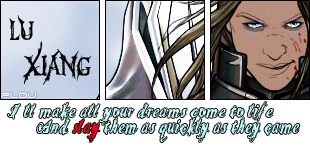Post by Lu Xiang on Feb 18, 2012 17:47:05 GMT
"I'd rather betray the world, than allow the world to betray me."
- Cao Cao to Chen Gong

all your base are belong to Mengde
Name: Cao Cao "Cao Mengde"
Age: 36
Gender: Male
Style: Canon
Personality:
Being a master of both the pen and the sword, Cao Cao is an excellent strategist, politician and poet. However, Cao Cao is also renowned for his short-temper; his dishonesty and his ability to disregard any who stand within his way. A lover of alcohol and women - but not a fool. Though Cao Cao's ambitions may appear to reflect much of say Yuan Shao or Dong Zhuo; he considers himself beyond them. Perhaps arrogant, or confident in his own abilities - there is no doubt however that Cao Cao is a dangerous man. Whether it is through his quick, well thought productive mind; or his wise selection of personel.
The "bad" guy. The Machiavellian. The Julius Caesar of Ancient China... or at least that is what the story teller Luo Guan Zhong wants you to think of Cao Cao. Ruthless, intelligent, user of ploys and ambushes, but yet chivalrous at the same time. He treats his loyal subjects and talents with respect and admiration, yet is paranoid and fearful of assassinations. Perhaps it is due to his "unpolitically correct" way of achieving success (through ploys, ambushes, trickery and murder) that is the cause for his negative portrayal in the story. It is said that the story itself was heavily edited to downplay Cao Cao's accomplishments so as to emphasize Liu Bei confucius-styled leadership. Either way, there is really no denying that Cao Cao is one of the greatest leaders of his time and one of the most famous Chinese historical figures
Weapon(s):
A simple chinese dao, equipped around the belt. Cao Cao prefers not to engage it combat; but when he was to, he is capable.
History:
Cao Cao, whose literary name was Mengde and pet name Ahman, was born to a powerful court official's family in Boxian County, Anhui Province. When a mere child, he grew very fond of poetry, history and books on the art of war. And through constant practice on horseback and in archery, he excelled in martial arts too.
At the age of twenty, Cao Cao held the official position of Beibuwei in charge of public order in the capital, Luoyang. On his first day at work, he made some artisans to make a dozen colored sticks to be hung at both sides of the official mansion, and issued an order that "anyone who violates the law will be beaten with these sticks". One evening while he was going the rounds in town, he found the uncle of one of the court officials bullying some civilians. Without a moment's hesitation, Cao Cao ordered that he be beaten to death in accordance with the law. From then on, nobody dared violate the law in the area governed by Cao Cao. Order in the city was never so good, and Cao Cao's name became known to all.
During the last years of the Eastern Han Dynasty, Emperor Xiandi of Han was obliged to leave Chang'an and take refuge at Luoyang owing to the fighting among powerful military commanders. Cao Cao was relatively weak in military terms at that time, but he was shrewd enough to take advantage of the opportunity to invite the emperor to come to Xuchang which was his domain. Naturally, the town became the provisional capital of the Eastern Han Dynasty. Then, Cao Cao began issuing orders in the name of Emperor Xiandi of Han, and gradually expanded his own military strength and sphere of influence. By cutting taxes and launching water conservancy projects, Cao Cao encouraged the farmers to develop production and successfully solved the problem of food supply. His power grew mightier and mightier, and as a result, he succeeded in unifying north China and establishing his own regime, the Kingdom of Wei
Stats:
Strength: 5/10
Endurance: 5/10
Intelligence: 9/10
Agility: 4/10
Courage: 2/10

